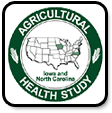Epidemiology Branch

The Agricultural Health Study (AHS) is a prospective study of licensed pesticide applicators from North Carolina and Iowa recruited in 1993-1997 at the time of license renewal. The cohort includes 52,395 licensed private pesticide applicators (more than 80% of those eligible to enroll), from both states and 4,916 commercial applicators from Iowa. More than 75% or 32,347 spouses of married private applicators were also enrolled in the cohort. The study is a collaboration of the National Institute of Environmental Health Sciences (NIEHS) and the National Cancer Institute (NCI).
Details of cohort characteristics and follow-up, including full questionnaires and response rates, and frequency of cancer and chronic disease diagnoses, are available on the study website. At enrollment, applicators completed a short enrollment questionnaire on farming, personal pesticide use and lifestyle factors. Those who completed the questionnaire received two take-home questionnaires to be completed by the female spouse of farmers and another for the applicator that obtained additional details on pesticide exposure and health. Enrollment questionnaires included demographic factors, self-reported doctors' diagnosed diseases, neurologic and respiratory symptoms, history of smoking and alcohol use, and a lifetime history of pesticide use, including 50 active ingredients.
During 1999-2003 and 2005-2010, follow-up surveys updated information on farming status, specific pesticide use, including ongoing use and newer pesticides, and changes in health status. Participants who completed the 1999-2003 interview were asked to provide a buccal-cell sample—for DNA and future analyses of gene-environment interactions—and complete a food frequency questionnaire. Subsequent cohort-wide follow-up surveys to identify new disease diagnoses and update key covariates were completed in 2013-2015 and 2019-2021. Additional case confirmation or validation data have been collected for Parkinson’s disease, systemic autoimmune and thyroid diseases. Regular linkages cohort to state cancer registries and vital records track cancer incidence and mortality. Health outcomes are also identified through linkage to the U.S. Renal Data (acute and chronic kidney failure), and CMS Medicare administrative claims data. Participant residential addresses have been linked to data on various environmental exposures, including water nitrates, heat, and natural disasters.
As an occupational group, farmers are unique in that they often live where they work, and their family members often participate in farming activities and may have inadvertent exposure to potential farm hazards. The AHS is one of the largest and longest studies of farmers and their families in the world, providing Epidemiology Branch investigators and collaborators with an invaluable source of information for research on health in agricultural communities. Topics of specific interest to NIEHS investigators, trainees and collaborators include neurobehavioral function and neurodegenerative diseases, sleep health, mental health, respiratory health, autoimmune disease, diabetes, infections, kidney disease, and thyroid disease. The NCI leads collaborative research on cancer in the cohort. Individuals interested in collaborating with the AHS should contact Christine Parks, Ph.D. to discuss opportunities.
Related Studies
Recent and ongoing add-on studies include:
- Agricultural Lung Health Study
- AHS Study of Memory and Aging
- Biomarkers of Exposure and Effects in Agriculture
- Pesticides and Sense of Smell
Principal Investigators
-
Dale P. Sandler, Ph.D.
Chief, Epidemiology Branch and Senior Investigator -
Tel 984-287-3711
Fax 301-480-3290
[email protected]
-
Christine G. Parks, Ph.D., M.S.P.H.
Staff Scientist -
Tel 984-287-3723
[email protected]


